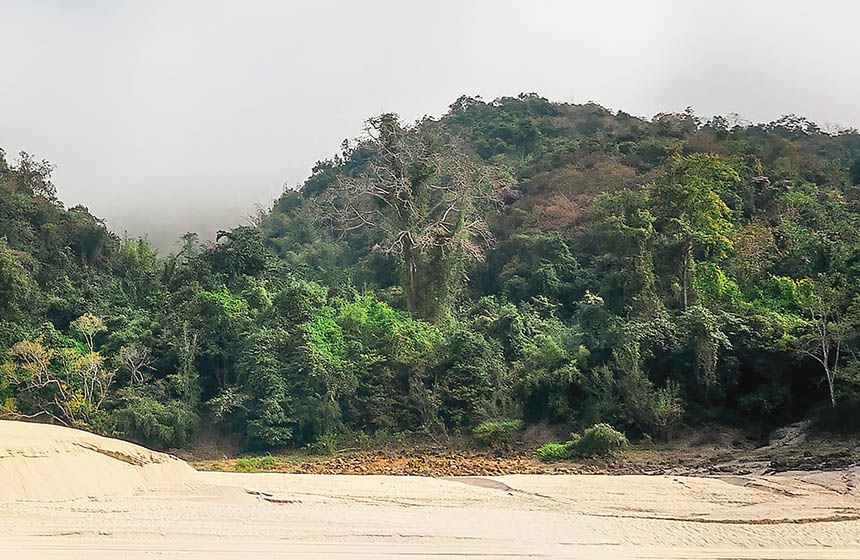Forest and riverbank restoration in a conflict zone near the Kpaya River
A female-led local NGO is championing forest restoration and sustainable resource management to counter devastating land degradation and improve food security in a conflict zone.
Nature-based Intervention:
Representatives from three villages have come together to form Amical Bè Ôko, a women-led NGO focusing on the reforestation of the degraded banks of the river, improving food security, and promoting sustainable resource management. The intentional use of palm and fruit-bearing trees serve to improve local health, nutrition, and food security. The replanting of the bambara groundnut and moringa trees species have been used to reclaim and restore over four hectares of overexploited and previously unusable farmland. The moringa tree in particular is known for its resistance to drought and can be harvested as frequently as every six weeks. The initiative promotes sustainable hunting and fishing practices.
Overview of context and outcomes:
Slash-and-burn agriculture, uncontrolled bushfires, and overgrazing have contributed to land degradation and food insecurity along the banks of the Kpaya River. Although slash-and-burn agriculture can be sustainable in tropical environments like the south-central region of the Central African Republic, demographic pressures in local villages have reduced the time that land is left fallow, negatively impacting soil fertility. Community members often use bushfires to aid in hunting, fragmenting habitats and endangering several species. Fishers on the Kpaya River often use micro-dams to increase their catches which can cause damage to the riverine ecosystem, reduce water availability, and cause substantial changes to the river’s microclimate.
Case effectiveness on
Climate change
Although not quantified, reforestation is likely to have enhanced carbon sequestration and storage potential across the landscape.
Moringa and raffia trees have reportedly served as firewalls in the area reducing the potential damage of bushfires. Slash-and-burn agriculture is reported to be less frequently practiced. Communities have noted that the Kpaya River water level, soil quality, and water quality have increased.
Ecosystem health
Ecological effect: PositiveReforestation has reportedly restored various ecosystem functions and the bambara groundnut and moringa both contribute important nutrients that enhance soil quality.
Socioeconomic outcomes
The reduction in micro-dam use for fishing and bank reforestation has increased water levels in the river which are reported to have improved fish stocks and agricultural productivity. Reforestation is also reported to have regulated the natural cycles of the river improving year-round water availability. The NGO has developed an innovative formula that combines bambara groundnuts with oil from raffia fruit trees to make a protein-rich milk for children.
Governance
Amical Bè Ôko is governed through a 162 member general assembly and a 15 member executive committee which is elected by the general assembly and handles most governance matters.
Finance
The project has received financial support from the UNDP-implemented GEF Small Grants Programme.
Monitoring and evaluation
There are no clearly reported monitoring protocols currently identified.
Trade-offs and limitations
The ambitions of Amical Bè Ôko are often challenged by the fact that the communities live in a rapidly escalating conflict zone. This has forced the female leaders of the NGO to take on management roles that include negotiating with the chief of the three villages to obtain plots of land that can be restored to improve food security.

Intervention type
- Management
- Restoration
Conducted at landscape scale
Ecosystem type
- Tropical & subtropical forests
- Streams, rivers, riparian
- Terrestrial production
Climate change impacts addressed
- Drought
- Reduced water availability
Instigators
- Community/self driven
Societal challenges
- Biodiversity conservation
- Climate change adaptation
- Climate change mitigation
- Conflict and Security
- Disaster risk reduction
- Food security
- Water security
Outcomes
- Food security: Positive
- Water security: Positive
- Health: Not reported
- Local economics: Not reported
- Livelihoods/goods/basic needs: Not reported
- Energy security: Not reported
- Disaster risk reduction: Positive
- Rights/empowerment/equality: Not reported
- Conflict and security: Positive
- No. developmental outcomes reported: 6
Resources
Read resource 1Literature info
- Grey literature



